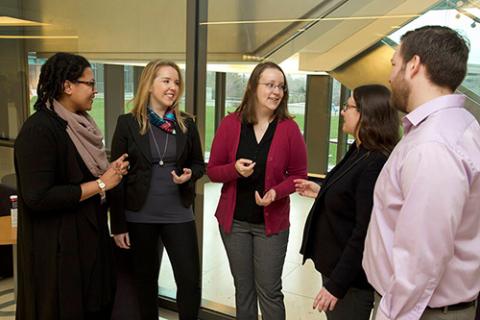New Fellow Orientation

New Fellow Orientation occurs in June of each year and facilitates the onboarding of both fellows initiating mentored research at the NCI and those commencing their M.P.H. studies. Sessions in this two-week event focus on exploring CPFP policies and expectations and learning about the organizational structure of the NIH and NCI. It also provides ample time to meet one-on-one with CPFP leadership and colleagues.
Learning for early Engagement and Development (LEAD) Summer Program
Upon the conclusion of the CPFP New Fellow Orientation, fellows initiating mentored research at the NCI engage in the CPFP Learning for early Engagement And Development (LEAD) program throughout their first summer at the NCI. This program includes a schedule of structured and self-directed activities aimed at planning an NCI program of research, networking to identify potential preceptors and collaborators, and assessing and filling knowledge and skill gaps for a well-supported launch of their NCI research activities.
Leadership and Professional Development Training
The foundation for success in the field of cancer prevention relies on leadership skills, professional excellence, and mastery of one’s scientific discipline. CPFP’s goal is to help fellows maximize their individual potential for leadership and scientific contribution to the field of cancer prevention. To do so, CPFP provides a formal, structured Leadership Training Series.
Activities in the series are designed to develop an awareness of self and those in our professional networks and culminate with the drafting of individual Leadership Statements.
Session topics include professional identity, managing change and transition, setting expectations, professional assertiveness, situational leadership, and inclusive leadership. Facilitators share best practices and encourage meaningful dialogue, empowering fellows to grow as insightful, empathetic, and confident leaders.
Communications Training
To help Cancer Prevention Fellows further develop their communication and presentation skills, the program provides formal training in the following areas:
- Long-form scientific presentation. This four-day workshop addresses the components and narrative of a scientific presentation, systematic approaches to presentation preparation, critical techniques for clear delivery, and ways to consider and engage your audience. The workshop includes individualized peer and expert coaching feedback.
- Elevator pitch. This training addresses the challenge of synthesizing your message when you have just a few minutes or less to make an impression.
- Plain language presentation. Researchers must communicate clearly outside their silos, across disciplines, and to lay audiences. This will ensure the furthest reach of scientific discovery, investment in ideas, and properly informed citizens.
Fellows are also provided with on-demand, expert formal coaching for individual scientific presentations or job talks.
Grants and Grantsmanship Training
The CPFP provides training in grant-writing through an annual Grants and Grantsmanship Workshop and a new Career Development Award Coaching Series. In addition to providing didactic and practical experiences in the grants process, a major outcome of these trainings is a draft of an application for internal or external research funds for all interested fellows. Demonstrating an ability to develop and organize ideas into a well-written proposal is a major determinant in many hiring and promotion decisions.
Fellow Research Meetings
Cancer Prevention Fellows and CPFP scientific staff attend the weekly Fellow Research Meeting (FRM), where fellows present the state of their research to a multidisciplinary audience. Fellows' preceptors and invited guests are welcome to attend.
Cancer Prevention and Control Colloquia Series
The Cancer Prevention Fellowship Program provides networking support for its postdoctoral fellows via a fellow-led speaker series, the NCI-wide Cancer Prevention and Control Colloquia Series. In addition to functioning as a platform for disseminating science, our speaker series framework aims to advance professional networking between fellows and experts outside of the NCI (e.g., those in academia, clinical settings, other government agencies, or industry). As a part of CPFP’s core training curriculum, each fellow is required to, with support and resources from the CPFP, nominate, invite, coordinate logistics for, and host at least one speaker in the series.
Annual Cancer Prevention Fellows' Scientific Symposium
The Annual Cancer Prevention Fellows’ Scientific Symposium is held each fall. The symposium brings together senior fellows, new fellows, and the CPFP staff for a day of scientific exchange in the area of cancer prevention. Fellows plan the symposium, including developing the program agenda and special workshops, and selecting invited speakers. The event also provides an opportunity for fellows to discuss their projects, ideas, and potential future collaborations.
Additional Training and Development Opportunities
- Fellows frequently participate in courses and workshops offered by academic institutions, the U.S. Federal Government, the Foundation for Advanced Education in the Sciences (FAES), and many other organizations. Fellows find these learning experiences to significantly enhance their research capabilities.
- Fellows can make the most of many rich environments during their time with the CPFP via short-term or part-time training rotations, or “details”, within other federal offices. These experiences augment the fellow’s career and/or research development and expose them to new perspectives and colleagues.
- The CPFP offers the opportunity for a formal training rotation within the FDA’s Center for Tobacco Products for fellows interested in tobacco control and the science that supports regulation. This experience is typically reserved for the later years of the fellowship, after a fellow has established their research program at the NCI.